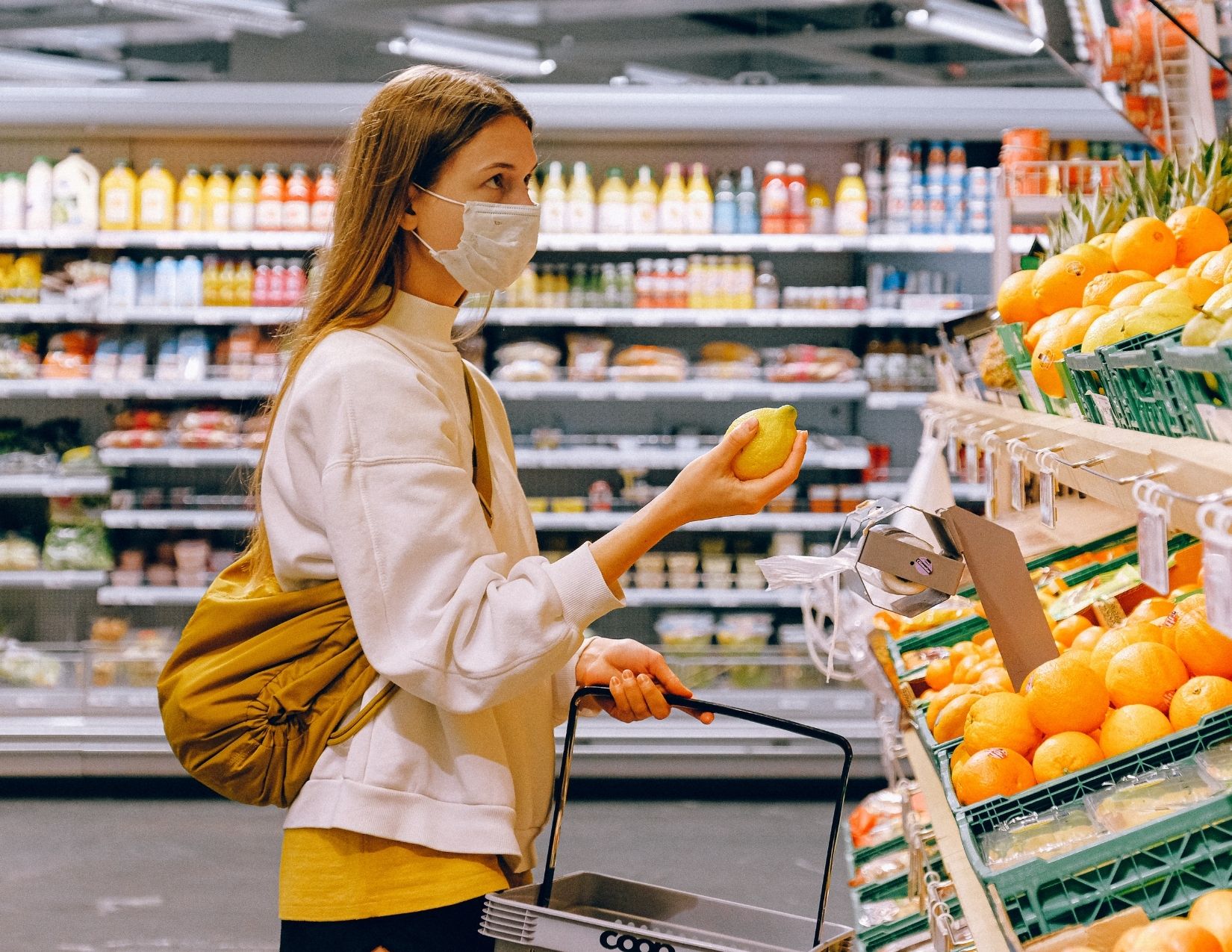SHARE
Ever wondered what’s on a holistic nutritionist’s grocery list?
You’ve likely seen me post about my weekly grocery hauls on Instagram (and if you haven’t then I highly recommend checking out the “my fridge” pin on my feed).

Grocery shopping can be one of the most overwhelming elements of maintaining a nourishing diet, but it might just be one of the most important too. What you buy at the grocery store is ultimately what you end up eating, so it’s a worthy endeavour to give some forethought as to how you can use your groceries to make delicious, nutrient dense meals that support clear skin! I’m sharing what’s on my grocery list as a holistic nutritionist so you no longer have to wander the aisles of Whole Foods aimlessly.
Have you ever heard the saying “Luck favours the prepared”? Well, it rings true for preparing meals! How many times have you gone to the grocery store with no plan, picked out a bunch of random foods you think you’ll eat and then found yourself standing in your kitchen, hungry with no cohesive ingredients to make a meal. If that’s you, then you need today’s grocery list tips. Because if you have a kitchen stocked with a variety of healthy essentials, you can pull together a meal or snack quite easily and deliciously.
What’s on a holistic nutritionist’s grocery list: Why a whole foods based grocery list is important
If you look at my shopping cart, you’ll see it is mainly comprised of fresh, whole foods. What exactly is a “whole food”? In short, a whole food is a food item in it’s natural, unprocessed, unaltered form. In other words, foods where the only ingredient is the food itself. This includes produce like fruits and vegetables, beans and legumes, fresh meats and seafoods, nuts and seeds etc.
Why are whole foods important? There are a number of reasons.
- Whole foods contain a mix of macronutrients and micronutrients in their natural form.
Let’s look at rice for example. Brown rice is a good source of dietary fibre and is considered ‘whole grain’ because only the inedible outer shell is removed, leaving the bran, germ and hull in tact. White rice is rice with the bran, germ and hull removed leaving for a low fibre, high glycemic grain with much of the vitamins and minerals stripped away. For that reason, brown rice would provide more fibre as well as vitamins and minerals than white rice. White rice can still certainly serve its purpose in a healthy diet, especially in sports nutrition, but I think you get my point.
2. Nutrients are (typically) more easily absorbed when consumed in whole food form.
While supplements are often an isolated version of a particular nutrient, whole foods almost always contain a wide variety of nutrients that work synergistically in digestion and absorption. Fruits and vegetables contain many different vitamins, but they also contain water and fibre to help with digestion and absorption of water soluble vitamins. Many meats contain fat soluble vitamins like Vitamin A and D, but they also contain fat to support the absorption of these vitamins. Additionally, whole foods will contain enzymes that also aid in digestion and absorption.
3. It’s easier to get a wider variety of nutrients in through whole foods than through supplementation.
Let’s say you eat a meal that comprises of brown rice, mixed vegetables (cooked and raw), a source of protein and some sauerkraut. You’re going to be getting a wide variety of vitamins and minerals, fibre, probiotics, protein, fat and phytonutrients just through eating a meal – something you have to do anyways! If you wanted to get all of those nutrients through supplementation, you would have to take a fibre supplement, multiple vitamins and minerals, a probiotic, a protein powder and a fat supplement, which would likely be just too much for your body to process.
Shop the perimeter of the grocery store
A simple trick to prioritizing a whole foods based grocery cart is to shop the perimeter of the grocery store. This is where you find the produce section, refrigerated section, meats, seafoods etc. In the aisles is typically where you find the cookies, chips and other more processed foods.
What EXACTLY is on a holistic nutritionist’s grocery list
1. An abundance of colourful fruits and vegetables
This is seriously the bulk of my groceries and what I build my meals around! I always prioritize two things when it comes to produce:
- Buy a wide variety of colours – Different colours in fruits and veggies often contain different nutrients, so shopping for a wide variety of colours helps ensure you’re getting a wide variety of vitamins and minerals in to support glowing, clear skin.
- Buy in season – Purchasing produce that is in season in your local area helps ensure that you are getting a more nutrient dense food. How? If you purchase a food that is out of season in your area, that means it has likely come from somewhere else in the world. When food travels a long way, it often undergoes some sort of preservation process, plus, its less fresh and has lost a lot of nutrients by the time it hits your plate. Buying in season means more acne fighting nutrients on your plate!
In addition to a variety of in season, colourful fruits and vegetables, some of my other staples are:
- Salad staples like cucumbers and avocado
- Fruits like bananas and oranges
- 1-2 boxes of mixed greens – my favs are kale and arugula!
2. High quality animal proteins
When it comes to acne, purchasing high quality animal proteins like meats, seafood and eggs is super important. Conventionally raised meats are commonly from animals raised with hormones and fed food ridden with pesticides. The issue with that is that those hormones and pesticides end up being ingested by people when they consume those meats. Pesticides can be hard on the liver while the consumptions of artificial hormones through conventional meats can lead to hormonal imbalances in the body – both of which can contribute to acne.
Here’s what I look for when it comes to animal proteins:
- Grass finished beef
- Organic free range chicken sausages
- Pasture raised eggs (in BC, the best place to buy eggs is farmers markets!)
- Wild salmon
- Prawns
3. Plant based proteins
I love having a mix of plant and animal based proteins and this can also help make your grocery bill more affordable! Plant based proteins most often also contain fibre and are lower in things like saturated fat and cholesterol. Fibre is an important part of an acne-friendly diet, as it helps support proper elimination – ridding the body of excess hormones and toxins that can accumulate and contribute to acne. My favourite plant based proteins are:
- Organic sprouted tofu
- Tempeh
- Beans like chickpeas, black beans, white beans, pinto beans
- Red dried lentils
4. Fresh herbs
While herbs can seem kind of unnecessary, they’re actually one of the best ways to enhance your meals! Herbs are instant flavour enhancers and also contain some fibre, phytonutrients and even some vitamins and minerals. I love adding herbs to my nourish bowls, eggs, pasta, anything! My favs are:
- Cilantro
- Parsley
- Basil
- Dill
5. Milk/Yogurt
Dairy is something I recommend avoiding for acne sufferers as it can contribute to inflammation and can be hard on the digestive system for many individuals. But we live in a beautiful time! There are amazing dairy free alternatives out there now that are just as satisfying and delicious. My go-to’s are:
- Califia Farms toasted coconut milk
- Yoggu dairy free yogurt
6. Other essentials
These are the things I buy to either enhance the flavour of my meals, add in some extra nutrients or just to add some fun!
- Saurkraut
- Kimchi
- Raw local honey
- Tahini or nut butters
- Coffee and/or tea
- Organic wraps or Ezekiel bread
What’s on a Holistic Nutritionist’s Grocery List: Do I buy organic?
This is a question I get all the time. I do strive to shop 100% organic but usually end up buying about 95% organic, which is still incredible!
There’s a lot to unpack on this topic, but I’ve summarized some key thoughts on organic food in relation to acne.
Why I recommend buying organic:
- Prioritizing organic foods can be beneficial for acne sufferers. As I mentioned before, pesticides used in conventional farming of plant based foods like fruits, veggies, nuts etc. can overwhelm the liver making it sluggish to process pesticides and other toxins. When the liver is congested, the body may turn to other detoxification pathways to try and rid itself of toxins and one of the main detoxification pathways in the body is the skin where we see conditions like acne and even eczema. Additionally, pesticides can elicit an inflammatory response in the body which can also trigger acne.
- Synthetic pesticides in non-organic food can act as endocrine disruptors. An endocrine disruptor is a chemical that can cause changes to the endocrine system (your body’s hormone system.) Hormonal acne is SO common and so are hormonal imbalances in general, so avoiding known endocrine disruptors can be beneficial for those suffering from hormonal acne. If you’re curious about which foods can help support balanced hormones, check out my blog post here!
How to get started:
First of all, don’t stress. Like any change you bring into your life, starting to buy organic will be a process. But with these tips, your grocery list will look like a nutritionist’s grocery list in no time.
- Shop according to the Dirty Dozen and Clean Fifteen – These lists outline the twelve foods that are most contaminated with pesticides and the fifteen foods that see the least pesticide use. Use this guide to know what to prioritize!
- Prioritize buying organic whole foods as these are the bulk of your diet. If you want to pick up a pint of ice cream as a treat or some paprika to flavour your food, don’t stress about buying organic if it’s unavailable or too expensive as these are small portions of your diet.
- Try farmers markets! Farmers markets are often where you can find the best quality of foods in terms of being organic, free range, pesticide free etc. and are typically less costly than going to an expensive urban grocery store.
Now that you’ve seen what’s on a Holistic Nutritionist’s grocery list, what tips will you implement? Feel free to tag me in your grocery hauls on instagram. Happy shopping!
